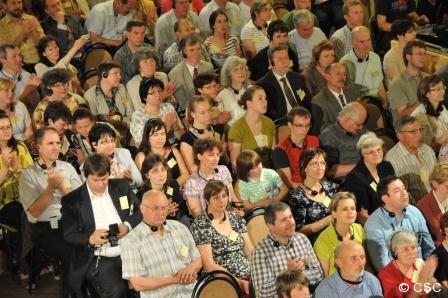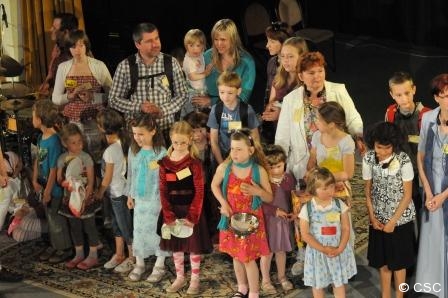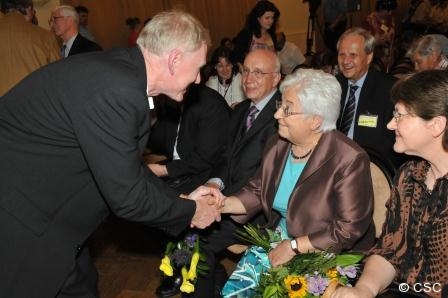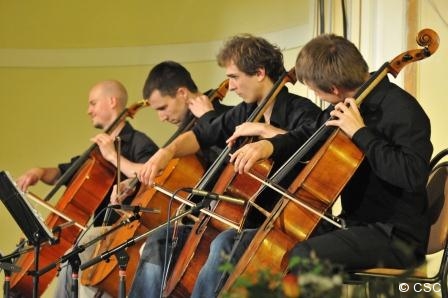 The history of the Focolare Movement in the Czech land has often been marked by heroism. The Ideal of unity first arrived there in the 1960’s when it was still Czechoslovakia and Soviet Communism was in power. Since 1968 and the Prague Spring, which was suffocated by occupation forces after which Communism became even more oppressive, until November 1989 when the regime was terminated, the history of the Czech people was marked by great suffering. But amid al the hiding and persecution many came to be part of the Focolare Movement and, today, more than 700 traveled from across the country to meet the president of the Focolare, in the Palace of Culture in Prague 5, one of the 10 municipalities which subdivided the city. There was excitement, joy and expectation. It was a feast for a family that was reminiscing and looking ahead.
The history of the Focolare Movement in the Czech land has often been marked by heroism. The Ideal of unity first arrived there in the 1960’s when it was still Czechoslovakia and Soviet Communism was in power. Since 1968 and the Prague Spring, which was suffocated by occupation forces after which Communism became even more oppressive, until November 1989 when the regime was terminated, the history of the Czech people was marked by great suffering. But amid al the hiding and persecution many came to be part of the Focolare Movement and, today, more than 700 traveled from across the country to meet the president of the Focolare, in the Palace of Culture in Prague 5, one of the 10 municipalities which subdivided the city. There was excitement, joy and expectation. It was a feast for a family that was reminiscing and looking ahead.  There were numerous questions for Maria Voce and Giancarlo Faletti. A Gen 4 asked: “What were your dreams when you were small?” and some Gen 3: “How did you come to know God? What would you do if you met a poor family? Why didn’t God intervene when Hitler killed so many people? ” Questions from the adults dealt with the significance of the president’s travels, how to pursue the involvement of some of them in the “reconstruction ” of the country, life in local communities of the Movement, and the danger of activism. “My travels bring me to find my family, and so they are a pleasure for me. I go to offer my support, to encourage, to see what everyone is doing,” says Maria Voce. And it doesn’t matter whether they are small or great things. “During a recent trip to North America, she continues, “where everything is huge and our community is small in contrast, I felt that Jesus among those who love each other is a “super-power”. And so the same invitation stands for the Czech Republic to believe in this power so that you can reach the entire nation. With this Ideal not only can we, but we must bring the message of the resurrection into the world, to bring Jesus into the school, the factories, the parliament. This is the greatest thing that we can do.”
There were numerous questions for Maria Voce and Giancarlo Faletti. A Gen 4 asked: “What were your dreams when you were small?” and some Gen 3: “How did you come to know God? What would you do if you met a poor family? Why didn’t God intervene when Hitler killed so many people? ” Questions from the adults dealt with the significance of the president’s travels, how to pursue the involvement of some of them in the “reconstruction ” of the country, life in local communities of the Movement, and the danger of activism. “My travels bring me to find my family, and so they are a pleasure for me. I go to offer my support, to encourage, to see what everyone is doing,” says Maria Voce. And it doesn’t matter whether they are small or great things. “During a recent trip to North America, she continues, “where everything is huge and our community is small in contrast, I felt that Jesus among those who love each other is a “super-power”. And so the same invitation stands for the Czech Republic to believe in this power so that you can reach the entire nation. With this Ideal not only can we, but we must bring the message of the resurrection into the world, to bring Jesus into the school, the factories, the parliament. This is the greatest thing that we can do.”  On the same afternoon (21 May) the meeting was opened to all those who wanted to know more about the Focolare “revolution”. The testimonies offered and the initiatives taken showed how this lifestyle has enveloped people of all ages. When considering the progress made since Chiara Lubich launched “Golden Prague” for the city in 2001, it was clear that the commitment to re-evanglize the city has never faultered, nor the fruits. Maria Voce proposed a new step to be taken: “In this country you breathe in history and spirituality which, even during the hardest times, were never destroyed, but perhaps only covered over and protected. Here we are not beginning from zero, we are beginning again from the deep roots left by those who built this society and this culture. The step that we must now take is to bring a new evangelization, a new proclamation, brought by people who have been made new by mutual love. We must commit ourselves to proclaim to others that Jesus is risen, that all the suffering has been redeemed: This is a time of joy.”
On the same afternoon (21 May) the meeting was opened to all those who wanted to know more about the Focolare “revolution”. The testimonies offered and the initiatives taken showed how this lifestyle has enveloped people of all ages. When considering the progress made since Chiara Lubich launched “Golden Prague” for the city in 2001, it was clear that the commitment to re-evanglize the city has never faultered, nor the fruits. Maria Voce proposed a new step to be taken: “In this country you breathe in history and spirituality which, even during the hardest times, were never destroyed, but perhaps only covered over and protected. Here we are not beginning from zero, we are beginning again from the deep roots left by those who built this society and this culture. The step that we must now take is to bring a new evangelization, a new proclamation, brought by people who have been made new by mutual love. We must commit ourselves to proclaim to others that Jesus is risen, that all the suffering has been redeemed: This is a time of joy.”  This was confirmed by Bishop Frantisek Radkovský, the Czech Republic Episcopal Conference delegate for the laity: “The Church has great expectations for the movements,” he affirmed during his remarks, “because they are her most dynamic part, a gift of the Holy Spirit for the modern times. Society today is secularized, but now there is an openness to spiritual things and it is important to show with (our) life that Christianity brings the humanism that is true. The movements have the ability to reach everyone and the most diverse fields of action are open to them, from the family to the school, from politics to the economy, from the mass media to sport.” As the meeting drew to a close, the musical quartet which had been offering some fine music throughout the day, began to play the theme song from “Mission Impossible”. It made everyone think that what is impossible for us will be possible for God. By Aurora Nicosia [nggallery id=42]
This was confirmed by Bishop Frantisek Radkovský, the Czech Republic Episcopal Conference delegate for the laity: “The Church has great expectations for the movements,” he affirmed during his remarks, “because they are her most dynamic part, a gift of the Holy Spirit for the modern times. Society today is secularized, but now there is an openness to spiritual things and it is important to show with (our) life that Christianity brings the humanism that is true. The movements have the ability to reach everyone and the most diverse fields of action are open to them, from the family to the school, from politics to the economy, from the mass media to sport.” As the meeting drew to a close, the musical quartet which had been offering some fine music throughout the day, began to play the theme song from “Mission Impossible”. It made everyone think that what is impossible for us will be possible for God. By Aurora Nicosia [nggallery id=42]
Avoid gossip
Avoid gossip




0 Comments